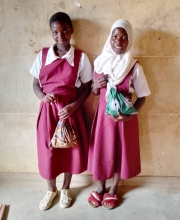Beneficiaries will be identified through an assessment form and the trustees of our partner charity Chanasa in Malawi will decide/ recommend who is to be funded. We have designed two forms: one for the Beehive Tailoring courses in Blantyre and one for other Technical and Tertiary Educational courses. The form includes proof of identity if necessary, a request for financial information about their family unit and income to determine their financial eligibility, proof of their educational attainment and written confirmation of a valid offer of a place on a course from an accredited educational institution. The head of the family unit and the candidate need to give their signature that the information is correct. For a tailoring course, a recommendation from their group leader or in the case of a group leader from the Chanasa Development Worker is required. All candidates also need to give their reasons for wanting to do the training and how they will use their training and make a difference on completion of their course. Decisions will be made on educational attainment and financial need. In the case of women being offered places at publicly funded universities in Malawi and them applying for a SOKO Fund or TEST for Malawi (Both are UK registered charities) scholarship and them being successful, the Chanasa and Chifundo trustees will accept their applications and process of selection and approval for each year of training. In the case of women who apply for funding and who have places on appropriate courses then they will also be interviewed by two of the four Chanasa trustees for selection purposes. Grants will be awarded on an annual basis and women will be required to pass any end of year exams in order to progress to the next year. A shortened assessment form will be completed for each year to ensure that the women’s circumstances have not changed. Chanasa Trustees will monitor and give feedback on women who receive grants and what difference it makes to their families and local communities when they have completed their training.
Payments for courses will be made directly to Educational Establishments which are Public Institutions and NGOs. The checks and monitoring that are carried out aim to ensure that funds are not diverted for non-charitable purposes, to prevent aid diversion and to comply with the relevant regulations (e.g. Bribery Act 2010, Terrorism Act 2000).






















